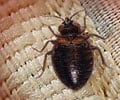Experiments on mice conducted at the University of Texas Southwestern Medical Center in Dallas offer a glimmer of hope that an experimental drug called LED209 will one day help cripple
An experimental drug called LED209 may one day help cripple drug-resistant bugs, according to results of experiments on mice conducted at the University of Texas Southwestern Medical Center in Dallas.
"We are getting into a post-antibiotic era with no new ammunition. There's not going to be one magic bullet out there; however, doing something like this, we are not speeding the process (of antibiotic resistance) too much," New Scientist magazine quoted Vanessa Sperandio, a microbiologist, as saying.She said that her team's experiments showed that blocking a bacterium's ability to sense human hormones could shut down its infection genes, and cripple its ability to kill mice.
She also said that early indications in mice hinted at few side effects.
The researcher revealed that LED209 was found to prevent bacteria from detecting two hormones key for mounting an infection, adrenalin and noradrenalin, without which pathogens like E. coli 0157:H7 could not churn out toxins or infiltrate animal cells.
When the researchers exposed mice to E. coli 0157:H7 or Salmonella, rodents that received the drug before infection fared far better than mice that received no antibiotics.
The team said that more animals survived, and there were fewer bacteria in their organs.
Advertisement
They said that four-fifths of the animals survived, while just 10 per cent of the untreated mice pulled through.
Advertisement
Since LED209 does not kill bacteria, the one bug in a billion that's lucky enough to be resistant to the drug won't get much of a growth advantage - the key to antibiotic resistance.
"You're not wiping the other ones out. You're having a softer evolutionary pressure against resistance," Vanessa says.
She, however, said that any test in humans was at least 5 years off, and that the actual wait would depend on how the drug faired in further animal studies.
"If we're lucky and we have a breakthrough, that'd be great. I'd rather be conservative," she said.
Her study has been published in the journal Science.
Source-ANI
RAS /J











